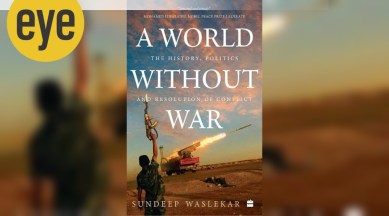In an incisive appeal for reason in an arms-mad world, Sundeep Waslekar’s A World Without War seeks to turn back the ticking nuclear clock
Keen observations of contemporary geopolitics are married to the history of war and peace in this urgent read

Amid a zeitgeist all but defined by a renewed global embrace of arms and armed “solutions”, A World Without War by the public intellectual Sundeep Waslekar is a work that challenges this emerging new order at two levels.
At one level, the book is as relevant as the demand from NATO chief Jens Stoltenberg at the recent Munich Security Conference that the alliance’s 30 members deliver on a 2014 pledge to boost arms spending to at least 2 per cent of GDP. It’s a familiar refrain, echoed in the arms build-up of Taiwan in reaction to China’s sabre-rattling, the rewrite of Japan’s constitution to allow an offensive military for the first time since World War II, missile tests in North Korea, the growing arms race between nuclear-armed India and Pakistan, US Pentagon spending that will near $1 trillion this year, and so much more.
Yes, the invasion of Ukraine and war crimes committed by Russia are horrific. But the good-vs-evil narrative of the war ignores years of warnings against end-of-Cold War triumphalism decades ago by many – including the father of containment, George Kennan.
There was another way.
Amid the world’s rush to more (and more sophisticated) weapons, the author asks: Can we really arm our way to global peace?
Waslekar answers that question at the second level, which is deeply philosophical and broadly historical, referencing Sigmund Freud on violent instincts, Albert Einstein on his call to legally abolish war, Mahatma Gandhi on the imperative to choose between anarchy and co-existence, and the philosopher Lou Marnoff on the 2,500 years of debate on whether war is innate to human nature.
The survey of technology, from the early machine gun created for the US Civil War by Richard Gatling, to the the hypersonic missiles of Russia over which the Americans are playing catch-up, to Israel’s killer robots first deployed in the 2020 Azerbaijan-Armenia war, Waslekar’s command of military hardware and software is peerless. So is his insight into the spread of biological weapons, which details endeavours underway to perfect these in some 60 laboratories worldwide.
Written during the pandemic lockdown and laced with palpable frustration, this is an angry book. It’s righteous tone may, in fact, be initially off-putting to some readers: “This book is necessary to shake people from their slumber…” is a line unlikely to win many converts. But as the reader is drawn into this dual narrative juxtaposing contemporary headlines against the history of war and peace, one comes to share Waslekar’s outrage.
If there’s a culprit in Waslekar’s analysis, it is nationalism and a badly broken nation-state system. America’s history of naked expansionism falls under his gaze, including the overthrow of democracy in Iran, Chile, Guatemala, Congo, Brazil, Vietnam, Bolivia and Chad. He explores the nature of Chinese nationalism and its transformation in the 21st century. His exploration of Korean nationalism is particularly revelatory, and how the failures of diplomacy after both the World Wars birthed “Juche”, the malignant ideology of North Korea. Waslekar’s own country and the Hindutva nationalism of India’s ruling party does not get a pass. In a “rising India..,” he writes…, “arms and wars are valourised every day by using television programmes, movies, songs, art exhibitions, sports and school activities, which are promoted to glorify the armed forces.”
But there is hope too in this book. In his accounting of a century-and-a-half’s diplomatic and civil initiatives, from the first Hague Conference of 1899 to the Helsinki Accords of 1975 to the almost successful deal between Ronald Reagan and Mikhail Gorbachev to eliminate nuclear weapons, Waslekar concludes that the moment is right for a “third Hague Conference,” an on-and-off idea discussed since 1915. In contrast to Stoltenberg’s appeal, this could include the phased elimination of all weapons of final destruction and a prohibition on applying new AI, genetic and biological technologies to warfare as well as a gradual and co-ordinated reduction in arms spending. Waslekar envisions creation of supranational institutions to monitor compliance, and new mechanism of binding arbitration to resolve conflicts – the teeth now missing at the United Nations.
Where to start on this daunting task? Perhaps, with this sombre but powerful book that fills a void in today’s global discussion.
(Writer and futurist David Judson is the former editor in chief of Stratfor, a geopolitical intelligence consultancy based in Austin, Texas)